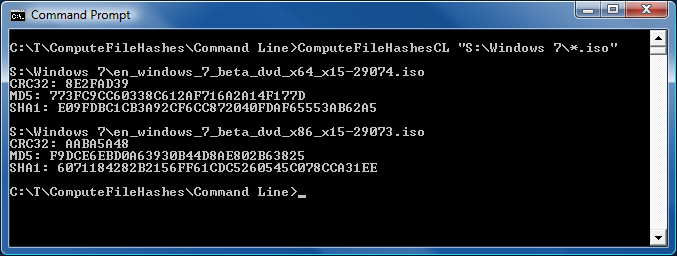The proverbial "one line fix" [ComputeFileHashes works around a troublesome Silverlight-on-Mac issue]
When I achieved cross-platform parity by adding MD5 support to the Silverlight version of ComputeFileHashes, I thought I was done for a while. But then I got an email from a coworker reporting that the Silverlight version of ComputeFileHashes running on a Mac under Safari presented an "Add Files" dialog that did not actually let the user select any files. Ouch, that's no good...
I started investigating with a quick web search; the top hit for "OpenFileDialog Mac" showed that others had experienced similar problems and the Silverlight team confirmed a bug. So at least my application wasn't totally broken. :) I wanted to understand the scenario better, but I don't own a Mac (which is why this problem escaped my notice in the first place). Fortunately, I found one at work that I could borrow some cycles on and I wrote a simple test application to invoke the OpenFileDialog with a few different values for the Filter property. ComputeFileHashes was initially passing the value "All Files (*)|*" - effectively just "*" - which was intended to match all files. And, indeed, it does so in WPF and Silverlight/PC. However, on Silverlight/Mac that value seems to match no files. Someone suggested "*.*", but to me that matches all files with a '.' in their name and I didn't want to exclude files that don't happen to have an extension. So I tried "" instead, and that did exactly what I wanted on Silverlight/Mac and Silverlight/PC. I thought I'd found the solution - until I tried the new value on WPF and it caused an exception...
At this point I was tired of cross-platform trial-and-error, and I decided I was inviting trouble by passing any filter string at all! The default behavior of OpenFileDialog is to allow the selection of all files, so I wasn't really adding much value by passing a custom filter that did the same thing. Well, I was providing more explicit filter text in the drop-down of the dialog, but it wasn't worth the compatibility problems I was dealing with. So I removed the line of code that set the Filter property, recompiled, republished, and called it done. :)
The latest version of ComputeFileHashes is now 2009-01-30. I've updated all the binaries in order to avoid version number confusion, but the only real change here is the filter string and the improvement is only visible on Silverlight/Mac. (Note: I did not update the screenshots below, so the versions shown there are out of date.)
- If you're using Silverlight to run ComputeFileHashes, you'll automatically get the new version next time you run ComputeFileHashes.
- If you're using ClickOnce to run ComputeFileHashes, the application will automatically update itself after you run it a couple of times.
- If you're using the WPF or command-line versions, you'll need to download the new binaries and update manually.
Please refer to the original release announcement for more information about supported platforms, source code, implementation, etc..



Seamless cross-platform support is a tricky matter that's usually best left to others who have the time and resources to do it right. I didn't realize I was introducing a platform dependency by specifying a filter string, but I was... and I got burned by it. That's why it's important to test an application on all the supported configurations: you never know what problem might show up where you least expect it! That said, I'm probably not going to run out and buy myself a Mac just because of this incident - so please accept my apologies in advance should I fall victim to a similar problem in the future. :)